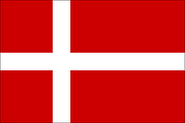 The Danish workforce is highly unionized, with 75% of workers belonging to a union. Most of the trade unions are part of an umbrella system. The Danish Confederation of Trade Unions (Danish: Landsorganisationen i Danmark, or LO) is the biggest one with 1.34 million members (Denmark has a population of 5.45 million). However, union membership has been slowly declining over time. I'm pretty interested to learn more about how European unions work, because unlike America's crappy unions I hear they aren't too bad.
The Danish workforce is highly unionized, with 75% of workers belonging to a union. Most of the trade unions are part of an umbrella system. The Danish Confederation of Trade Unions (Danish: Landsorganisationen i Danmark, or LO) is the biggest one with 1.34 million members (Denmark has a population of 5.45 million). However, union membership has been slowly declining over time. I'm pretty interested to learn more about how European unions work, because unlike America's crappy unions I hear they aren't too bad. With over 100,000 employees worldwide and 2005 revenues of $34.8 billion, the biggest company in Denmark is the A.P. Moller-Maersk Gruppen. It is a consortium primarily engaged in shipping and transportation, and is the largest container ship operator and supply vessel operator in the world. It is also engaged in petroleum and natural gas exploration and production, shipbuilding and ship repair, supermarkets, and owns 20% of Dansk Bank, Denmark’s largest bank.
With over 100,000 employees worldwide and 2005 revenues of $34.8 billion, the biggest company in Denmark is the A.P. Moller-Maersk Gruppen. It is a consortium primarily engaged in shipping and transportation, and is the largest container ship operator and supply vessel operator in the world. It is also engaged in petroleum and natural gas exploration and production, shipbuilding and ship repair, supermarkets, and owns 20% of Dansk Bank, Denmark’s largest bank. Dansk Bank A/S itself is the second largest company in Denmark. Although it primarily operates in Denmark, it also purchased the banking interests of Sampo which operates in Finland, Estonia, Latvia, and Lithuania, and also banks in Sweden (various banks), Norway (Fokus Bank), Ireland (National Irish Bank), and Northern Ireland (Northern Bank).
Dansk Bank A/S itself is the second largest company in Denmark. Although it primarily operates in Denmark, it also purchased the banking interests of Sampo which operates in Finland, Estonia, Latvia, and Lithuania, and also banks in Sweden (various banks), Norway (Fokus Bank), Ireland (National Irish Bank), and Northern Ireland (Northern Bank).The LEGO Group is around the 46th largest Danish company.
 One of the Danish companies you are likely to have heard of is Bang & Olufson, who designs and manufactures high-end stereos and audio equipment, televisions, and telephones. They have a store here in the twin cities at the Galleria. Even if you haven’t heard of them or don’t have the cabbage to shop at B & O, you may be using their products and not even know it – B & O makes the popular A8 earbuds that come with most iPods.
One of the Danish companies you are likely to have heard of is Bang & Olufson, who designs and manufactures high-end stereos and audio equipment, televisions, and telephones. They have a store here in the twin cities at the Galleria. Even if you haven’t heard of them or don’t have the cabbage to shop at B & O, you may be using their products and not even know it – B & O makes the popular A8 earbuds that come with most iPods.In case you're wondering about some of the acronyms after the names of Danish companies, here is what a few of them mean:
A/S (Aktieselskab) A stock based company
ApS (Anpartsselskab) Limited liability corporation
AB (Aktiebolag) Swedish word for corporation (there are a lot of joint Swedish-Danish companies)
Here is a good summary.

No comments:
Post a Comment